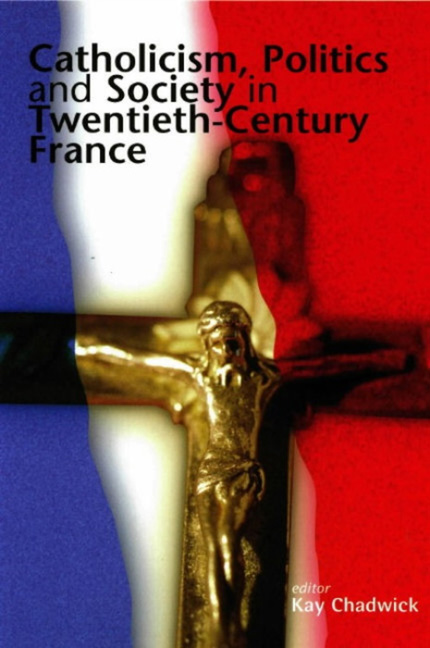Book contents
- Frontmatter
- Contents
- Editor's preface
- Notes on contributors
- Abbreviations
- Introduction
- 1 La laïcité en France au vingtième siècle
- 2 Antisémitisme des catholiques au vingtième siècle: de la revendication au refus
- 3 Catholicism and Nationalism: the Fédération républicaine, 1927–39
- 4 True and false modernity: Catholicism and Communist Marxism in 1930s France
- 5 Ralliés and résistants : Catholics in Vichy France, 1940–44
- 6 Les formes politiques de la démocratie chrétienne en France au vingtième siècle
- 7 Catholicism and the Left in twentieth-century France
- 8 Accueillir l'étranger : immigration, integration and the French Catholic Church
- 9 Yeast in the dough? Catholic schooling in France, 1981–95
- 10 Les femmes catholiques: entre Église et société
- 11 La sociologie religieuse du catholicisme français au vingtième siècle
- 12 Secularisation and the (re)formulation of French Catholic identity
- Select bibliography
- Index
12 - Secularisation and the (re)formulation of French Catholic identity
- Frontmatter
- Contents
- Editor's preface
- Notes on contributors
- Abbreviations
- Introduction
- 1 La laïcité en France au vingtième siècle
- 2 Antisémitisme des catholiques au vingtième siècle: de la revendication au refus
- 3 Catholicism and Nationalism: the Fédération républicaine, 1927–39
- 4 True and false modernity: Catholicism and Communist Marxism in 1930s France
- 5 Ralliés and résistants : Catholics in Vichy France, 1940–44
- 6 Les formes politiques de la démocratie chrétienne en France au vingtième siècle
- 7 Catholicism and the Left in twentieth-century France
- 8 Accueillir l'étranger : immigration, integration and the French Catholic Church
- 9 Yeast in the dough? Catholic schooling in France, 1981–95
- 10 Les femmes catholiques: entre Église et société
- 11 La sociologie religieuse du catholicisme français au vingtième siècle
- 12 Secularisation and the (re)formulation of French Catholic identity
- Select bibliography
- Index
Summary
In his 1936 novel, Journal d'un curé de campagne, Georges Bernanos chose the setting of a rural parish to explore the crisis besetting French Catholic culture. The parish was the natural focus of identity. It was more than a geographical area: it had a history that reached back to the era of Christendom in which religion was woven into the social fabric, and shaped a whole culture. Moreover, French Catholicism from the Revolution until the First World War had a very clearly defined self-identity summed up in the word ‘intransigence’: namely, adherence to an interlocking set of anti-liberal political and religious principles. It is to this identity that a minority of French Catholics continue to cleave today. The majority, however, accept political pluralism, while remaining divided on how far liberal attitudes should be allowed to influence the content of religious belief itself.
That there is a crisis of identity in French Catholicism is apparent in the dispute over the criteria of identity. In Gabriel Le Bras's enquiry into French Catholicism in the 1930s the key determinant of belonging was attendance at liturgical worship, especially Mass. Obeying the Church's moral teaching, especially in matters of sex, hearing Mass and receiving the sacraments still remain yardsticks of orthodoxy. Such formal criteria of belonging are challenged, however, by those who privilege a psycho–social approach to religious identity. Canonical definitions of incorporation are replaced by subjective expressions of faith which involve an element of indeterminacy. What does it mean to be a Christian, let alone a Catholic in contemporary French society, and where is the dividing line between the secular and the religious? Even the language of believers is becoming less religious. Where references to heaven, hell and the devil do occur, they are often to be found in plays and films, outside a liturgical context. They are no longer witnesses to Revelation but have become ‘les ruines admirables d'une symbolique ouvrant à tous des possibilités d'invention et d'expression’. The Church, of course, has magnificent monuments, but what use are they if they are empty of life, and what does the local or village church signify?
- Type
- Chapter
- Information
- Catholicism, Politics and Society in Twentieth-Century France , pp. 260 - 279Publisher: Liverpool University PressPrint publication year: 2000



